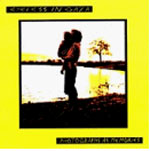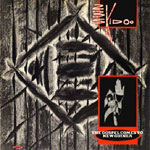Photographs as Memories
| |

| It's 1981 and Eyeless in Gaza's first LP, Photographs as Memories hits the racks. I used to see them live the year I lived and worked in Coventry - two blokes with the minimum of instruments who came on like an angst-ridden hybrid of Orechestral Manouvres and Captain Beefheart. Who else could make so much noise with an electric guitar, a Wasp synthesizer, a Rolf Harris stylophone, a primitve drum machine and assorted percussion? Not forgetting Martyn Bates frightening singing of course. On this CD reissue Martyn Bates writes [in 1999] that 'This is the music of a voice finding itself'. I think he does Eyeless and himself a disservice. This is the sound of a voice finding new music, giving voice to pure emotion. It is a startling, abrasive, unprecedented music. It is as original and radical as Pere Ubu's or Magazine's early records, as free jazz live when it works, as the best abstract painting; as full of surprises as is possible. And it still is. 'profusion of words - while you talk liquid fire, spoken and inferred' sings Bates in 'Speech Rapid Fire', which kind of sums up his lyrics nicely. Splinters of [non]sense and raw feelings, anger, love and confusion; a torrent of emotion sung over raw, brave music. No concessions, no prisoners, no let up. At the end of this CD are some of the moments previously only available to us as plastic fragments, seven-inch obscurities. Here, Eyeless aren't afraid to be quieter and to experiment with abstraction, removing the pulse that is the backbone of the LP tracks. These tracks are as elusive and fragile as birdsong, as overheard conversations, traffic passing in the distance. The band would later go on to produce much more of this sort, sometimes integrating it into their albums, sometimes using at for compilations or as b-sides for singles Eventually they would make a couple of pop records, Back from the Rains and Red Rust September, and split up; then reform years later for a second bite of the apple. But nothing Eyeless did was ever again this intense and moving, as naive and illumined, as raw and exciting. It reminds me of sitting in a cold house in Crewe during my first winter at college. The LP's [and now CD 's] tinted family snapshot on the cover a ray of unexpected sunshine in the gloom, the music an exhilarating noise |

|
A little later on and 23 Skidoo came into my view. The recent The Gospel Comes to New Guinea is a strange CD anthology of singles, ep tracks and remixes, plus a couple of tracks from their noisy masterpeiece The Culling is Coming, which it now seems is not going to get the CD reissue it deserves. Much of the music here is of its time, anglicised funk with noisy edges: an 'avant-garding' approach to dance and funk, with samples and loops in the mix. [They used to issue very pretentious press releases too, and witter on about 'discipline' and the martial arts too.] The three tracks from the 'Tearing up the Plans' ep are highlights [where is the beautiful industrial-ambient second half of the title track though?], as is the 12 inch mix of 'Coup'. Elsewhere, I wonder why I bothered with the band, why the singles are still cluttering up boxes downstairs... it's pretty lame stuff. And to not reproduce The Culling... in its noisy entirety is a crime! This LP contained much of the live set from their appearance at the very first Womad Festival; here, on CD, we only get the quiet 'Healing/Fanfare' track which doesn't even hint at the aggression and energy of their live performance as captured on the original LP. Yellow hose from roadworks, random handfuls of tape, metal percussion, chanted vocals, all combined to produce a 20 minute plus aural hell, a mesmerizing endurance test for the audience [yes, I was there] before the gentle lulling, the ambient gamelan a studio version of which became the second side of the LP. The original LP had an infamous lockgroove halfway through side 1, so the listener had to physically lift and move the stylus over for their [metaphorical] healing. We get none of this, although 'Healing/Fanfare' remains a beautiful piece of improvisation. And I have fond memories of that Womad: the sunshine, the sheer amount of new 'world' music to be heard, the headlining bands in the evenings, the endless buskers, the campsite percussion jam, and late night spiced coffee bought from a lantern-lit stall as we wended our way back to our tents. And of shaven-headed pop radicals startling the morning audience with their radical cut-up noise-funk. And for that I am grateful and recommend this music. © 2003 Rupert Loydell |